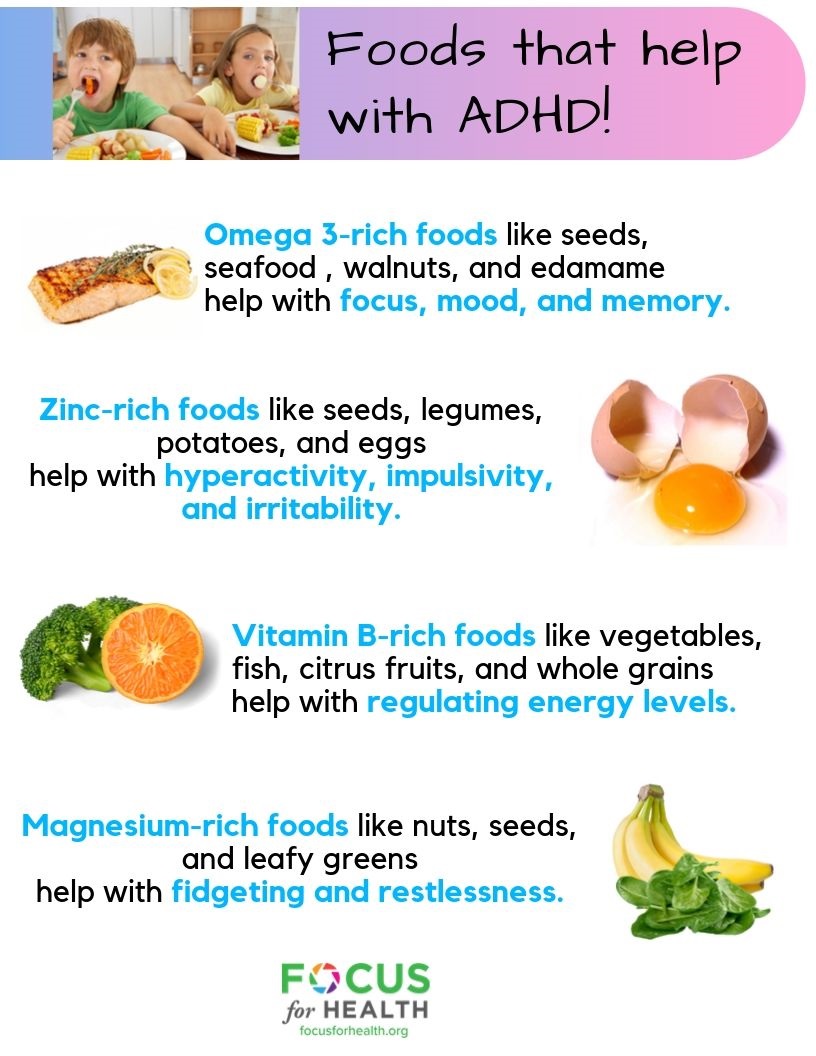 Make sure to conduct micronutrient deficiency testing, as previous periods of malnourishment or malnutrition have been associated with symptoms of ADHD. Many micronutrients (more on them later) directly impact symptoms and mechanisms involved with ADHD, such as zinc, iron, magnesium, and B vitamins. Screening for food allergies and sensitivities is also a very important step, as they will give you a baseline for what food your child shouldn’t be eating.
Make sure to conduct micronutrient deficiency testing, as previous periods of malnourishment or malnutrition have been associated with symptoms of ADHD. Many micronutrients (more on them later) directly impact symptoms and mechanisms involved with ADHD, such as zinc, iron, magnesium, and B vitamins. Screening for food allergies and sensitivities is also a very important step, as they will give you a baseline for what food your child shouldn’t be eating.
For children with ADHD, diets that seek to mitigate or minimize oxidative stress are key, as oxidative stress is significantly associated with ADHD. Increased consumption of Omega-3’s may inhibit oxidative stress and neuroinflammation, leading to improvements in hyperactivity, attention, short-term memory, and impulsivity. Some good sources of Omega-3s are flaxseeds, chia seeds, seafood (salmon, shrimp, herring, trout), walnuts, and edamame.
There is a growing body of evidence that ADHD symptom severity and low levels of zinc are linked. Zinc controls the synthesis of many neurotransmitters in the brain, including dopamine and serotonin, and zinc deficiency has been associated with anxiety and hyperactivity in children with ADHD. Many foods offer zinc, such as:
- Seeds (pumpkin, sunflower, etc.)
- Legumes (chickpeas, lentils, beans, peanuts),
- Nuts (cashews and almonds)
- Eggs and whole grains
- Potatoes (all kinds)
B vitamins are crucial for inflammatory response and strong immune function. B vitamin deficiencies can compromise brain development, nerve conductivity, and regulation of neurotransmitters, which can lead to severe symptom expression in those with ADHD. Some of the healthiest sources of B vitamins are:
- Fish
- Whole grains (rice, oatmeal, bread)
- Eggs
- Vegetables (broccoli, spinach, asparagus)
- Fruits (citrus, avocados, bananas)
Fiber is crucial for children with ADHD due to studies indicating that high-sugar diets increase inattention in some kids. Fiber helps to keep blood sugar levels stable, giving children consistent energy and lowering inflammation body-wide. Some healthy sources of fiber are whole grains, nuts, legumes, and seeds.
ADHD is strongly associated with lower levels of folate, and hyperactivity in children is associated with lower maternal folate markers. Some good sources are leafy greens, legumes, fruits and whole grains.
If there’s one thing to take from the connection between ADHD and diet, it is that a healthy diet can have drastic effects on the severity and expression of your child’s ADHD symptoms, and is good for your child’s health in an innumerable amount of ways.


I have two special kiddos. #1 is hyperactive, but not ADD. #2 is ADD but not hyperactive. I am trying to figure out something that may work for both.
Stacey ,
I would make sure you revisit that diagnosis
Alot of professionals misdiagnose ADHD
As i was diagnosed Hyper Active
And later found out i was ADHD
After many ,many Health professionals .
A Social worker was the one to diagnose .
The problem is the level of ADHD is different for everybody .
It may pass for one and grow in another
As they both grow .
My suspicion is both have it .
ADHD can be a tough obstacle but can be overcome with the constant effort to understand it.
That’s what my kids are going threw the same thing just like u we went to the doctors yesterday and told me on eofbmy wonderful kids has adhd my 4 year old my 7 year old has add
my child is adhd and is having trouble at school he was on medication but wasn’t eating so I stopped it what can i do
Adderall
Extended Release is different than regular adderall
Educate yourself on youtube on ADHD
Tedx talks and other self help videos like
The science of adhd
I am trying neurotherapy/ biofeedback for my 7 year old.
Hi! I was wondering if you seen any improvement with the nuerofeedback
Hello. I believe my child may have 80 HD and we have tried vyvanse but he stopped eating. I have also tried other options such as kids attention gold drops. Can you offer any other advice?
Most all medications will cause side effects. I would recommend trying an adhd diet. Such as eating fish, vegetables, nuts, etc. Take out high sugar foods and food coloring. Look up a diet plan for adhd. This will have no side effects.
My son has been diagnosed with ADHD and after 5 months of debating we’ve started him on on aderral: and I’ve been researching other alternatives instead of medication and found Dr Amen that does studies of the brain and gives supplements and food diets. What can you suggest or if heard off
My son is 9 and was diagnosed at 5 with adhd and agression. His dad and I have postponed medication for a couple years yet never being able to be get a consistency with him Day to day since we are now divorced.
I do want to try medication consistantly but my sons dad opposes it and wants to change his diet which I’m willing to do but is there a kid friendly diet to recommended for a picky eater? Also his aggression is strong will the diet make such a difference for no meds?